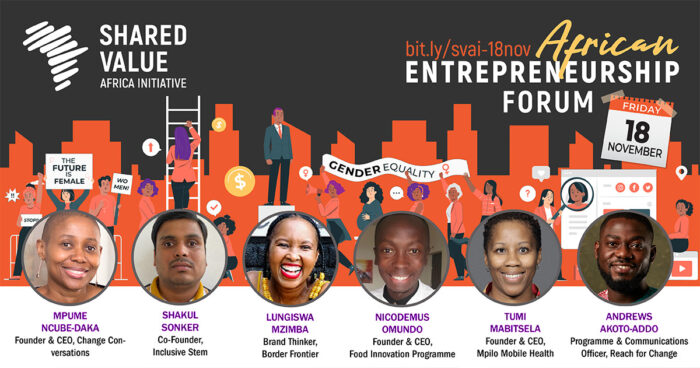Equality and Access in the Workplace
An Entrepreneurs’ Perspective
Africa is generally referred to as “a young continent” – by 2050, the continent will have 362 million young people between the ages of 15 and 24 years old. It’s also the fastest growing continent, with an estimated 375 million young people in the job market by 2030. This could bode well for the continent… but we face high numbers of unemployment.
While the circumstances of their lives are measurably better than they were in the past, a significant gap between the number of young people seeking work and the limited employment opportunities available to them means that they will face challenges finding formal employment and a pathway out of poverty.
In recent years, Africa has produced an unprecedented number of entrepreneurs, and while these start-ups and SMMEs represent hope for better circumstances for many on the continent, they still face challenges in realising the desired growth and impact.
Since February 2020, the SVAI has regularly convened the African Entrepreneurship Forum; a virtual event to create a platform where entrepreneurs can connect, share their hopes and challenges, and obtain information on disciplines and practices that can enhance their businesses.
Advancing gender equality can have significant benefits not just for global GDPs but also for society, where an empowered citizenry is able to contribute to the economy as well as fight against ills such as gender-based violence and femicide. Moreover, as an integral part of economic growth on the continent, it is crucial for SMMEs to participate in creating more equitable workplace and landscape.
To this end, the 18 November edition of the Forum was convened under the theme Equality and Access in the Workplace – An Entrepreneurs’ Perspective. The forum was moderated by Andrews Akoto-Addo, a member of SVAI’s Africa Council of 8 and Programme Officer at Reach for Change.

Mpume Ncube-Daka, Founder of Change Conversations, was the keynote speaker and focused on entrepreneurs can drive equality, diversity and inclusion. “We are all about creating value, and being competitive in our different industries. While this is a topic typically expected of big corporates to engage in, small businesses have the power to do so too and affect positive change.” She cited research which has shown the business benefits of a more diverse and inclusive workplace – the direct economic impact as a result of uplifting women, girls and marginalised members of society.
For entrepreneurs, intentionality in diversity and inclusion means including it in the company vision and strategy, as well as embedding this into one’s organisational culture – no matter where on the growth curve the business finds itself. Diverse teams contribute to improved collaboration as nuances are brough to the table in solution or product design, and this encompasses gender, race and cultural perspectives.
Co-Founder of Inclusive Stem, Shakul Sonker outlined what tends to exclude certain people in our daily lives – and stressed the need to create solutions that ensure more inclusive and access for all. Shakul also highlighted ‘information famine’ – where there is a lot of information in the world, but it is not accessible by all (98% of the internet is not accessible to people with visual impairment). Inclusive Stem responds to this need by helping improve accessibility in development.
Within these accessibility challenges, women are that much more disadvantaged. Responding to the shortcomings here will result in a more empowered citizenry who can access information as well as opportunities for upliftment and employment.
The panel discussion delved deeper into this topic addressing the unconscious bias and need for self-reflection as enterprise leaders and members of society.
Tumi Mabitsela, Founder & CEO of Mpilo Mobile Healthcare reflected on this from a healthcare perspective. Access to specialist women’s healthcare services is that much more extreme, especially in a society that battles healthcare challenges across the board. She also highlighted how unconscious bias plays a part in career opportunities that are seen as more suitable for women, like nursing, and in a society with high unemployment rates, men lose out as a result of this bias.
Nicodemus Omundo, Founder of Food Innovation Programme, spoke of the danger of food being weaponised, and with Africa having so much potential with regards to the agricultural industry injustices have to be addressed immediately and comprehensively. While programmes do exist, they don’t seem to sufficiently making a difference.
Lungiswa Mzimba Founder of brand and marketing consultancy Border Frontier challenged fellow entrepreneurs to truly think of inclusive pathways when scaling up businesses. The need to have a more representative value chain – and in how one is intentionally designing and innovating products and services with representation in mind. This will help transform any brand, especially with a more conscious consumer base that challenges brands to be more purpose-driven.
A mindset shift is important to ensure comprehensive and sincere alignment to building a truly equal, diverse and inclusive work environment. It needs to be part of an enterprise’s DNA, and not an afterthought. This brings sustainable value to what each entrepreneur can offer the market.
Creating Shared Value, due to its principle of affecting positive change in society through business, was agreed on as an important tool to addressing an issue of diversity, inclusion and accessibility.
For a full recording of the session, please visit our YouTube channel.




